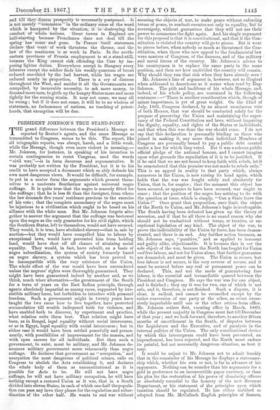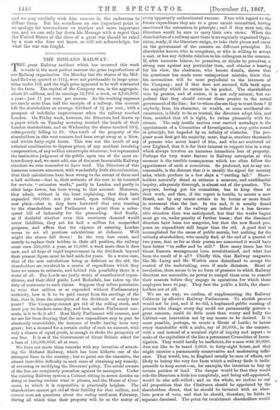PRESIDENT JOHNSON'S TRUE STAND-POINT.
T'grand difference between the President's Message as reported by Reuter's agents, and the same Message as transmitted to Congress, seems to be this. The report, like all telegraphic reports, was abrupt, harsh, and a little weak, while the Message, though even more violent in meaning,— Mr. Johnson, for instance, in speaking of his intention in certain contingencies to resist Congress, used the words " civil war,"—is in form decorous and argumentative. It was probably not written by the President, but it is to his credit to have accepted a document which so ably defends his own most dangerous views. It would be difficult, for example, to put in a neater form- the arguments which present them- selves to a moderate Southerner against universal negro suffrage. It is quite true that the negro is scarcely fitted for the suffrage ; that he is less fit than the foreigner, from whom the law demands five years' residence previous to the exercise of his vote ; that the complete ascendancy of the negro must be injurious to a civilization which ought to be based on his alliance with the white man. But Mr. Johnson forgets alto- gether to answer the argument that the suffrage was bestowed upon the negro as the only guarantee for his civil rights, which the Southern States, left to themselves, would not have secured. They would, it is true, have abolished slavery—that is, sale by auction—but they would have compelled him to labour by exceptional laws, would have prevented him from holding land, would have shut off all chance of attaining social equality. They would, in fact, have rebuilt, on a basis of negro subordination, the system of society formerly based on negro slavery, a system which has been proved to be incompatible with the very existence of the Union. The whole effect of the war would have been surrendered unless the negroes' rights were thoroughly guaranteed. They might have been guaranteed indeed by another and, as we think, much wiser alternative—the government of the South for a term of years on the East Indian principle, through agents absolutely impartial as among races, supported by irre- sistible military force, but forbidden to interfere with personal freedom. Snch a government might in twenty years have taught the two races how to live together, have protected accumulation till wealth indisposed both for violence, and have enabled both to discover, by experiment and practice, what relation suits them best. That relation might have been, as in Bengal, legal equality without social intercourse, or as in Egypt, legal equality with social intercourse ; but in either case it would have been settled peacefully and perma- nently, with possibilities of improvement for the masses, and with open careers for all individuals. But then such a government, to exist, must be military, and Mr. Johnson de- nounces military government more vehemently than negro suffrage. - He declares that government an " usurpation," and usurpation the most dangerous of political crimes, calls on Congress to abolish the Acts establishing it, and declares the whole body of them as unconstitutional as it is possible for Acts to be. He will not have negro euffrage, he will not have military occupation, he will have nothing except a restored Union as it was, that is, a South divided into eleven States, in each of which one-half thepopula- tion can pass any laws they please for the regulation and subor- dination of the other half. He wants to end war without securing the objects of war,to make peace without enforcing terms of peace, to readmit enemies not only to equality, but to sovereignty, without guarantees that they will not use their power to commence the fight again. And his single argument for this proposal is that it is constitutional, and that if the Con- stitution is violated the country will go to pieces. But it went to pieces before, when nobody so much as threatened the Con- stitution, when those who now appeal to the fundamental law were masters of Congress, of the finances, and of the military and naval forces of the country. Mr. Johnson's advice to his countrymen is to replace the same party in the same position, and then see how undivided the country will remain. Why should they run that risk when they have already seen I Mr. Johnson's line of argument is, however, not so illogical when addressed to Americans as it seems when read by Eng- lishmen. The pith and backbone of his whole Message, and, indeed, of his whole policy, are contained in the following sentences :—" There is another consideration which, though of minor importance, is yet of great weight. On the 22nd of July, 1861, Congress declared, by an almost unanimous vote of both Houses, that war should be conducted solely for the purpose of preserving the Union and maintaining the supre- macy of the Federal Constitution and laws, without impairing the dignity, equality, and rights of the States or individuals, and that when this was done the war should cease. I do not say that this declaration is personally binding on those who joined in making it, any more than individual Members of Congress are personally bound to pay a public debt created under a law for which they voted. But it was a solemn public official pledge of the national honour, and I cannot imagine upon what grounds the repudiation of it is to be justified. If it be said that we are not bound to keep faith with rebels, let it be remembered that this promise was not made to rebels only." This is an appeal in reality to that party which, always numerous in the Union, is now raising its head again, which holds that the war was fought solely and absolutely for Union, that is, for empire ; that the moment this object has been secured, or appears to have been secured, war ought to cease ; that the position of the negro has nothing to do with the question at issue, which is simply, " Can a State leave the Union I" Once grant that proposition, once limit the object of the North to Union, and Mr. Johnson's logic is irrefragable. The South having been defeated has given up the theory of secession, and if that be all there is no sound reason why she should not be readmitted without terms, or treaties, or ex- ceptional legislation of any kind. The object of the war, to prove the indivisibility of the Union by force, has been demon- strated, and there is an end. Any further action becomes, as Mr. Johnson says, " punitive," and as applied to innocent and guilty alike, objectionable. It is because this is not the sole object of the war, because the North has fought for Union and free labour, and not for Union alone, that further guarantee are demanded, and must be given. The Union is secure, but free labour is not secure, is the very reverse of secure, and it must be secured before any real or permanent peace can be declared. This, and not the mode of guaranteeing free labour, is the essential and irremediable quarrel between the President and Congress. He says the war was for one object, and is finished ; they say it was for two, one of which is not safe, and it, therefore, is not finished. Such a dispute, it is clear, is radical, and cannot be reconciled except by the entire conversion of one party or the other, an event exces- sively improbable until one or the other retires from office. Mr. Johnson retires first, vacating office in March, 1869, while the present majority in Congress must last till December of that year ; and we look forward, therefore, to another fifteen months of unsettlement in the South, of disputes between the Legislature and the Executive, and of paralysis in the internal politics of the Union. The only constitutional device by which this interregnum could have been prevented, an impeachment, has been rejected, and the North must endure its painful, but not necessarily dangerous situation, as best it may.
It would be unjust to Mr. Johnson not to admit frankly that in the remainder of his Message he displays a statesman- ship which, whether his own or not, is far in advance of his opponents. Nothing can be sounder than his arguments for a gold in preference to an inconvertible paper currency, or than his plea for the restoration of his power of dismissing officers as absolutely essential to the honesty of the new Revenue Department, or his statement of the principles upon which taxation should be regulated. He has either imbibed or adopted from Mr. McCulloch English principles of finance, and we may cordially wish him success in the endeavour to diffuse them. But his soundness on one important point is no apology for unsoundness on another and more important one, and we can only lay down his Message with a regret that the 'United States at the close of a great war should be ruled by a man who does not know, or will not acknowledge, for what the war was fought.







































 Previous page
Previous page